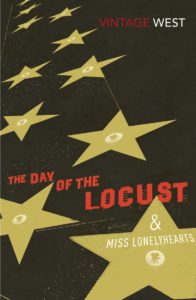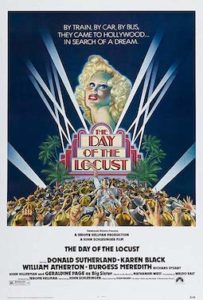
Previously: Introduction
When I ask other writers to name the greatest Hollywood novel of all time, the more well-informed usually reply The Day of the Locust by Nathanael West.
The Day of the Locust‘s reputation as greatest of all time is earned. The opening chapter may be the finest three pages ever written on the contradictions of Southern California. With disgust (and a little glee) West holds up for display Hollywood’s winners as well as the legions of desperate outsiders shut out of Hollywood’s dream factory—those “who came to California to die.” There is plenty of foreshadowing of the novel’s conclusion, yet when the finale arrives it still surprises and shocks without coming off as a twist ending. In between the first and last chapters is not so much a novel about Hollywood, but a novel about those standing on their tiptoes looking over the fence to steal a peek of Hollywood.
West was a New Yorker transplanted to Los Angeles, and his alien status is confirmed on every page. Los Angeles architecture is almost always described in quotes. A house is “Spanish” or “New England” or “Moorish.” Hollywood debauchery is not so much of the Playboy Mansion variety, or even Roman bacchanalia, it’s just cheap and pathetic. The airing of a French farce in a Sunset Boulevard cathouse may be the least erotic description of porn on record. Simulacrums of decadence are mistaken for actual decadence, such as a horse hooves-up at the bottom of a swimming pool during an open-air cocktail party. (No fear, it’s a rubber prop.) California’s artifice, inauthenticity, and halfhearted stabs at opulence are the brick-and-mortar of Locust‘s plot. The first chapter ends noting “Few things are sadder than the truly monstrous,” which may as well be the novel’s thesis statement.
Scene after scene, West lays down an unsparing case damning Hollywood’s emptiness the way a district attorney builds a point-by-point case for the death penalty—but where is the Lot character who escapes the city’s inevitable downfall? West’s ship of fools are uniformly impotent and ineffective. As with West’s other gem, Miss Lonelyhearts, there is little to root for here.

W. H. Auden identified “West’s Disease” as “a disease of consciousness which renders it incapable of converting wishes into desires.” In Auden’s formulation, wishes are whimsical and ethereal (“I wish I was a movie star”). Actual desire motivates the individual into action: “I’m going to enroll in acting classes and practice three hours a day.” (I’ve written more deeply about “West’s Disease” and W. H. Auden.)
Hollywood’s success as a dream factory is predicated on knowing our wishes and actualizing them on the silver screen. That’s why Hollywood appears a tantalizing cure for West’s Disease. Its siren song drew the characters to California from the humdrum Midwest and the frosty East Coast. Even if West’s misfits could muster up the energy and exert the effort to make it big, Hollywood’s antibodies would swarm to keep these ineffectuals a far distance from the beautiful, powerful, and well-connected. Besides, Hollywood only creates desires, it never actually fulfills them. There’s more than a few reasons West’s original title was The Cheated.
This inability to generate true desire makes the characters of Locust torpid and submissive. It’s why the book’s finale is so shocking: The characters finally shake off their doldrums, convert whimsical wishes to primal desires—and they act on them. The energy of the final pages is all the more pronounced when compared to the impotence of the preceding chapters.
(The movie adaptation of Locust has been called a horror film in disguise. West’s grotesque, helpless characters, each a mere audience to their own slide into destruction, and the suppressed violence released orgasmically in the finale, lines up with many horror film tropes.)
Much of The Day of the Locust is based on Nathanael West’s experiences in Los Angeles churning out film noir and adventure screenplays for Republic Productions (known as “Repulsive Productions” among Hollywood insiders; biographer Marion Meade refers to the studio as “Cheapsville.”) His produced scripts were marginally successful. His novels fared considerably less well, at least, in his lifetime.
West’s fortune seemed to be turning around right before he and his new bride were killed in an auto accident. West wasn’t exactly martyrized, but his writer associates did see to it to spread word of his genius, including Budd Schulberg, who declared The Day of the Locust captured how “the orgiastic crowd, loving you this moment, destroying you the next, is the very essence of Hollywood—as Hollywood may be the essence of our success-driven culture.”

“Only those who still have hope can benefit from tears.”